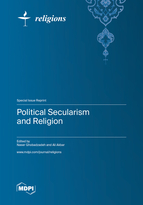Political Secularism and Religion
A special issue of Religions (ISSN 2077-1444). This special issue belongs to the section "Religions and Theologies".
Deadline for manuscript submissions: closed (25 November 2022) | Viewed by 33655
Special Issue Editors
Interests: Middle East Politics; political Islam; state-religion relations; secularism; Iranian politics; Islamic political thought
Interests: contemporary Quranic hermeneutics; Islamic law; contemporary Islamic political thought; political violence; state-religion relations; women’s rights in Islam; Middle East politics, Iranian politics
Special Issue Information
Dear Colleagues,
This Special Issue explores the approaches of religious leaders and movements to the secular political system. The secularisation thesis was a metanarrative that provided a simple and linear explanation of historical processes that predicted the demise of religion in both private and public life. The central idea of this thesis was its prediction that the elimination of religion is both inevitable and desirable. The idea of secularization comprised several components, the majority of which have been discredited in recent decades. However, some components of the thesis are still valid and are normatively prescribed as positive phenomena, in particular the idea of the separation of religious authorities and institutions from the leaders and institution of the state, which is referred to as political secularism. Political secularism does not necessarily mean the elimination of religion from the public and political arenas. A cursory examination of the numerous countries with secular political systems reveals that religion plays a role in the political arena of these countries in various ways. Religious leaders take diverse approaches and play a wide range of roles in politics. The most headline-generating roles are those of radical movements, especially in the Islamic world, that aim to completely overthrow the secular political system and establish a religious state. At the other end of the spectrum are religious groups and movements that have embraced secular political structures and sought to achieve their politico-religious aspirations through participation in electoral processes. Between these two extremes, a plethora of configurations of roles played by religious actors can be identified and conceptualized in countries with secular political systems. This Special Issue seeks to examine the diverse approaches of religious leaders and movements to the secular political structure. Its analyses will have both descriptive and prescriptive dimensions and will include both country case studies and theoretical explorations. The Special Issue will include some articles that examine the practical approaches of religious leaders and movements in the political arena of secular systems, while other articles will be devoted to the ideas of religious thinkers who offer prescriptions for how religion should engage with and play a role in politics within the framework of secular political systems.
In this Special Issue, original research articles and reviews are welcome. Research areas may include (but are not limited to) the following:
- religious leaders and movements’ acceptance or non-acceptance of secular political structures;
- religious leaders and movements’ strategies towards participation in the political arena of countries with secular political systems;
- religious thinkers and theologians’ theories about or in response to the idea of political secularism;
- secular governments’ approaches to the role of religion in the public and political spheres;
- comparisons between the attitudes and strategies of different religious movements towards political secularism;
- challenges to secular political systems caused by the presence of religion in the political arena;
- opportunities for secular political structures to benefit from the presence of religion in the public and political spheres.
Dr. Naser Ghobadzadeh
Dr. Ali Akbar
Guest Editors
Manuscript Submission Information
Manuscripts should be submitted online at www.mdpi.com by registering and logging in to this website. Once you are registered, click here to go to the submission form. Manuscripts can be submitted until the deadline. All submissions that pass pre-check are peer-reviewed. Accepted papers will be published continuously in the journal (as soon as accepted) and will be listed together on the special issue website. Research articles, review articles as well as short communications are invited. For planned papers, a title and short abstract (about 100 words) can be sent to the Editorial Office for announcement on this website.
Submitted manuscripts should not have been published previously, nor be under consideration for publication elsewhere (except conference proceedings papers). All manuscripts are thoroughly refereed through a double-blind peer-review process. A guide for authors and other relevant information for submission of manuscripts is available on the Instructions for Authors page. Religions is an international peer-reviewed open access monthly journal published by MDPI.
Please visit the Instructions for Authors page before submitting a manuscript. The Article Processing Charge (APC) for publication in this open access journal is 1800 CHF (Swiss Francs). Submitted papers should be well formatted and use good English. Authors may use MDPI's English editing service prior to publication or during author revisions.
Keywords
- political secularism
- religious movements
- secularization thesis
- religious thinkers
- theologians
- state institution
- religious authority
- religion-state relations






